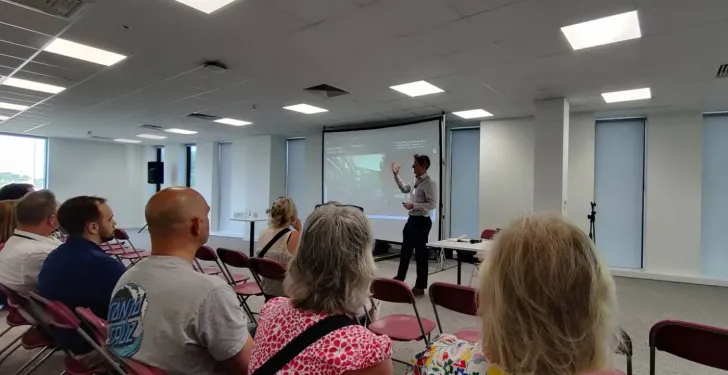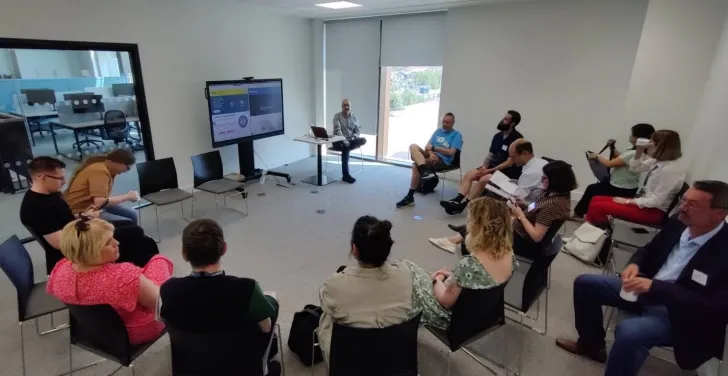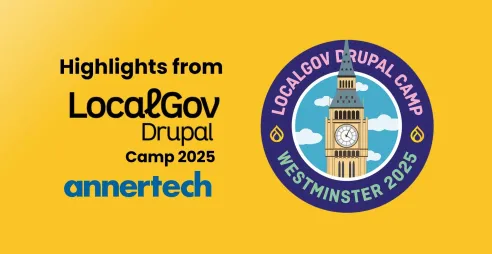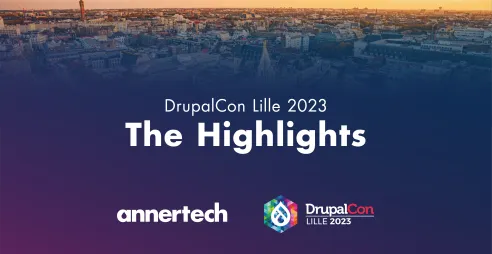Reflections from LocalGovCamp South West

Annertech was a proud sponsor of LocalGovCamp South West 2025. This key UK event focused on digital transformation in local government. These are just some of our highlights.
We were excited to head off to Taunton’s Firepool Digital Innovation Centre on 19 June for LocalGovCamp South West 2025 – which had promised to be relevant, practical and solution-driven, featuring public sector leaders, digital professionals, and changemakers from across the UK.
It was a jam-packed day, but here are a few moments that truly stood out:
The pre-event delivery drama
An event just doesn’t feel complete unless you have the swag and banners ready, but we had some drama with the courier unable to deliver our packages to the venue.
Thanks to a quick call and my wife’s willingness to drive us from Bristol to the depot in Exeter, we managed to intercept two of the three packages. A quick call to the delivery driver and we met up at Taunton Station for the final pick-up. Luckily, the venue was just a minute walk away.

Packages secured, it was off to the hotel and then the traditional pre-event curry at Gurkha 3 – the perfect opportunity to connect with colleagues from across the country.
The day: A cool venue and inspiring talks
We were fortunate to have amazing weather and an excellent venue, the air-conditioned, high-tech Firepool Centre for Digital Innovation.
The opening talks were a deep dive into how UK councils are leveraging AI for efficiency, using Local Government Reorganisation (LGR) for streamlining services, and focusing on cyber innovation and security. Notably, Cheltenham Borough Council is making significant moves by creating a National Cyber Innovation Centre.
Highlight 1: AI in local government
UK councils are exploring AI to boost efficiency and improve services while addressing challenges like data privacy, ethics and workforce training. It's an exciting area with a lot of potential.
Artificial Intelligence (AI) has the potential to transform the way local councils operate, making services more efficient and tailored to the needs of residents. By leveraging AI technologies, councils can streamline their internal processes, analyse data more effectively and improve the overall quality of services offered to their communities.
One area where AI can have a significant impact is customer service. AI-powered chatbots and virtual assistants can handle routine inquiries, providing quick and accurate responses to residents. This allows human staff to focus on more complex issues, reducing wait times and increasing satisfaction.
Additionally, AI can enable multilingual support, making council services more accessible to a diverse population.
AI can also play a pivotal role in data analysis and decision-making. By processing large volumes of data, AI can identify patterns and trends that might be missed by human analysts. This can help councils allocate resources more effectively, detect instances of fraud, and anticipate the needs of residents. For example, predictive analytics can be used to identify areas that may require more social services or targeted interventions.
Moreover, AI can optimise operational efficiency within councils. Automated scheduling, intelligent traffic management, and predictive maintenance of public infrastructure can save time and reduce costs.
By adopting AI technologies, councils can not only improve service delivery but also foster a culture of innovation and adaptability, ensuring they remain resilient in the face of future challenges.
Highlight 2: Local Government Reorganisation
Local Government Reorganisation aims to streamline services and enable stronger strategic leadership by consolidating into unitary authorities; making local services more efficient and resilient. It is a complex and challenging endeavour, especially when it comes to aligning digital services across newly merged authorities.
One of the primary digital challenges posed by LGR is the merging of existing websites. Each council often operates its own site, developed over years with unique architectures, varying technologies, and bespoke interfaces. Combining these into a single, coherent digital platform requires significant planning and resource allocation. This entails aligning site structures, ensuring seamless user experience, and preserving critical information and services for residents throughout the transition.
Another challenge is aligning digital services across departments. Different authorities have developed their own internal systems and external digital offerings, making interoperability a significant hurdle. Integrating disparate databases, standardising digital service offerings and creating a unified service request process are crucial steps that must be managed meticulously.
This process goes beyond merely merging websites – it requires rethinking service design, data sharing policies, and security protocols across the new entity.
It was fascinating to listen to the challenges facing councils who are undergoing this reorganisation process, and to see how they are using technology to overcome these challenges and come up with solutions that work.
Highlight 3: Securing our digital future
Cheltenham Borough Council is actively creating spaces for cybersecurity innovation through its Golden Valley development, aiming to solidify the town's position as a leading UK cyber hub.
By creating spaces for cybersecurity innovation they’re making sure that security is baked in from the very start. It’s an exciting space to be in, and we can’t wait to see the developments coming out of this hub.

Highlight 4: Local Digital and the LocalGov Drupal framework
Local Digital and the LocalGov Drupal solution help councils create user-centric digital services. LocalGov Drupal is a CMS created by councils for councils. Annertech led an engaging session that highlighted LocalGov Drupal’s accessibility standards, document management features and seamless data migration capabilities.
Director of Delivery Mike King and Managed Services Director Anthony Linsday’s AMA (Ask Me Anything) style workshop – a structured event where a designated individual or group is available to answer questions from the audience in a live, interactive format – was interactive and at times quite entertaining.

Titled “LocalGov Drupal – improving digital experiences for your customer”, they explored the LocalGov Drupal solution and how it can help local governments create user-centric digital services.
Mike opened by asking what the guests would like to know and if they’d seen or used LocalGov Drupal before. One person had no knowledge of LocalGov Drupal and was interested in seeing its offerings, so we started with an overview of LocalGov Drupal, looking at the structure such as landing pages, signposts and other features like the main content types, building blocks, banners, subsites and microsites.
A question was asked around accessibility and what level LocalGov Drupal meets. It was nice to hear that LocalGov Drupal is accessible by design, with accessibility baked in from the start meaning it meets a minimum of WCAG 2.2 level AA. Proudly, accessibility is a core part of LocalGov Drupal.
A member of the audience spoke of issues around document management within their current solution and that document uploads are problematic where they become hard to find and get duplicated or left. Mike spoke about how LocalGov Drupal has the ability to target sections of a site that can be tailored for indexing or have multiple indices helping keep track of documents.
Mike moved on to demoing several sites that we've built, including a new site for Solihull Metropolitan Borough Council, to highlight the common features you’d expect to see and how the look and feel can vary depending on requirements.
He also spoke about how some features are contributed back into the LocalGov Drupal ecosystem for other councils to leverage. This is one of its strengths.
Mike addressed questions about data import and migration to a new LocalGov Drupal system, explaining that we primarily leverage Drupal's core Migrate module to map and transfer existing data, with third-party tools like site scrapers and custom scripts as additional options.
Anthony covered developing tailored solutions like the Haringey Learns site with LMS integration and web enrolment, distinguishing between subsites, like Essex's, and separately hosted, self-service microsites such as Love Essex for specific needs like waste disposal, and addressed common questions around internal developer ownership (it’s your site – your developers can use it or build upon it), how we as a company offer security updates under Managed Services, and our relationship with Platform.sh for managing development staging environments.
The afternoon followed an unconference style format where short 35-minute talks were suggested by individuals to cover pain points or to invite others to share ideas. The crowd showed their level of interest by giving a cheer of “wooo!” and clapping!
Highlight 5: The unconference sessions, a Promptathon and ‘no to Copilot and AI’
The afternoon featured short talks and a lively "Promptathon" discussing the role and value of AI prompting. From building confidence with AI to sharing best practices across councils, this interactive session sparked ideas about creating a prompt library for wider use.
On the other side of the coin was a talk that focused on the critical reasons why AI and Copilot should not be widely adopted by councils.
The discussion began with individual concerns about AI's unsuitability for various council operations. A central theme was the necessity of robust governance when considering AI, alongside a strong emphasis on preserving the human element in communication.
Anthony explained that AI is just "supercharged predictive text." It's good at specific, narrow tasks but struggles with broader problems and many variables.
He pointed out that AI isn't truly "intelligent" and can significantly replicate human biases and prejudices.
For an easier-to-understand dive into what AI can and can't do, he recommended the book "You Look Like a Thing, and I Love You" by optics research scientist Janelle Shane.
Final thoughts
LocalGov Camp South West was a testament to the collaborative and innovative spirit within the public sector. It was an inspiring day filled with thought-provoking discussions, valuable connections, and a strong reminder that, together, we can build a more resilient and user-focused future for local government.
I walked out of the venue buzzing with ideas and energy – and I’m already counting down to the next instalment of this unmissable event.

Want to be part of shaping the future of digital in local government?
Whether you're a changemaker, digital innovator or are simply passionate about public sector transformation, get in touch to learn how Annertech supports digital excellence in local government.



